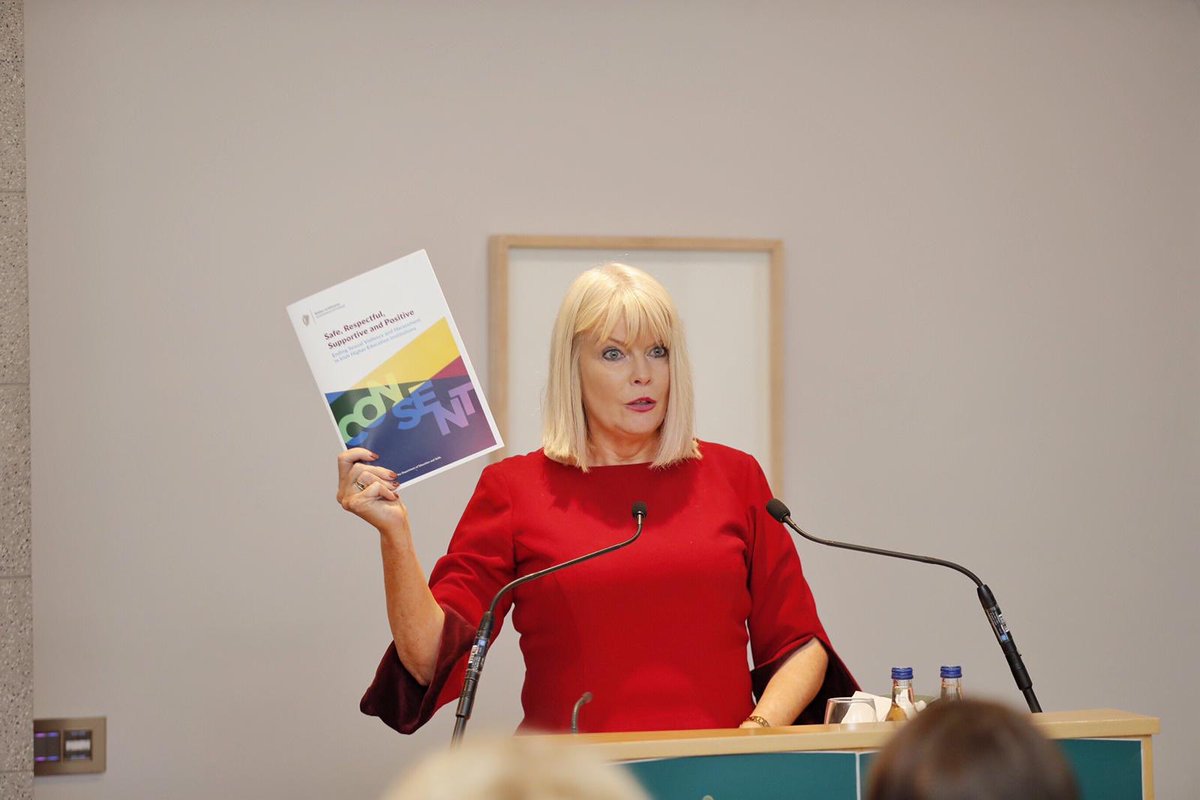Minister of State for Higher Education Mary Mitchell O’Connor launched a government plan this morning to reduce sexual violence and harassment in higher education institutions, stating that they have “no place in our institutions”.
The plan contains a number of guidelines for institutions, including making available and raising awareness of support services and providing a transparent system for addressing student complaints of sexual harassment and assault. Mitchell O’Connor announced that €400,000 would be made available to institutions to assist them in implementing changes.
The plan sets out a number of targets for institutions to achieve and encourages them to assign responsibility to a member of management staff to implement the plan.
The initiative was launched by Mary Mitchell O’Connor at an event in Government Buildings this morning attended by representatives of various institutions as well as the President’s wife, Sabina Higgins.
Speaking at the launch, Mitchell O’Connor stated: “Sexual violence and harassment has no place in our institutions. It is unacceptable that any student, researcher or staff member should experience it. Through the development of this framework, I believe we can escalate an institutional culture change on our campuses.”
Mitchell O’Connor added that the plan set out a framework for taking a “system wide approach” to “change the culture” of institutions. She said that there is currently a “real and serious problem with consent”, adding that this was “failing our students and therefore failing our society”.
The project, entitled “Safe, Respectful, Supportive and Positive: Ending Sexual Violence And Harassment in Irish Higher Education”, was developed over six months by an advisory group made up of academics, students, and leaders in the area of sexual health among students.
The group was chaired by Dr. Anne Looney, the executive dean of the Institute of Education at Dublin City University (DCU).
While the document recognises the importance of consent classes, Mitchell O’Connor stressed that they “are unlikely on there own to change the culture”. She noted that these classes would not be made compulsory as people need to take part in them “because they want to attend, not because they are being forced to”.
The plan stresses the importance of higher education institutions recording incidents of sexual violence and harassment and reporting statistics of incidents to the Higher Education Authority (HEA). Mitchell O’Connor expressed regret that the statistics which were used by the advisory group were “out of date” and said that in order to affect change, “an accurate baseline understanding of student experience” was required.
In an attempt to deal with this problem Mitchell O’Connor used the opportunity to announce a national national survey of consent, conducted by Dr Padraig MacNeela of the National University of Ireland, Galway (NUI Galway), which will be the first of its kind since the Union of Students’ in Ireland (USI) “Say Something” study in 2013.
The advisory group which created the plan was convened at a consent workshop in October 2018 which was held in Dublin castle. The group’s chair, Dr Anne Looney, said that at the workshop she had been “shocked” by the stories of “sexist hostility towards undergraduate students” and that there was a “mood in the room of anger and determination”. She added that the aim of this plan was to create a culture in institutions “where staff and student complaints are taken seriously and responded to consistently”.
USI President Síona Cahill, who participated in the advisory group, spoke at the launch, stating: “We’re not going to stand by and allow what is happening on our campuses to continue.” She welcomed the actions taken by government “to improve this situation” and said she “appreciate[s] sincerely the commitment of Mary Mitchell O’Connor to the issue”.
There was an opportunity at the event for members of the audience to ask questions. Noeline Blackwell, the Chief Executive Officer of the Dublin Rape Crisis Centre asked when the funding would be made available, to which the Minister responded that she hoped it would be ready for the beginning of the next academic year.
Megan Reilly, President of NUI Galway Students’ Union (NUIGSU) and USI Vice President for Equality and Citizenship-elect asked how policy would be standardised across institutions. Mitchell O’Connor stressed that institutions are autonomous but that they would be “expected to report back to the HEA on how they are implementing” the guidelines set out in the document.
Trinity College Dublin Students’ Union (TCDSU) President Shane De Rís said that the increased number of reported incidents was “putting strain on counselling services” and asked if there would be any additional funding for support services. Mitchell O’Connor could not guarantee extra funding but said it was her “job at the cabinet table during budget times” to advocate for more funding for these services, adding: “I will be banging that table for more money.”
Speaking to Trinity News after the launch De Rís said it was “great to finally see a sectoral approach to consent education on our campuses”.
Consent workshops were introduced in Trinity for Trinity Hall (Halls) residents in 2016 during Freshers’ Week and have since been rolled out to include clubs and societies across campus. The workshops focus on developing students’ understanding of consent, which a recent nationwide study by NUI Galway found to be limited.






